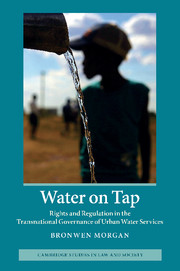Book contents
- Frontmatter
- Contents
- List of figures
- List of tables
- Acknowledgements
- Introduction: The field of global water policy: struggles over redistribution and recognition
- 1 Rights, regulation and disputing: a conflict-centred approach to transnational governance
- 2 Managed liberalisation and the dual face of French water services provision
- 3 ‘Another world is possible’: Bolivia and the emergence of a participatory public provision model for access to urban water services
- 4 Regulatory arbitrage and popcorn politics: contrasting disputing pathways in Argentina and Chile
- 5 Moonlight plumbers in comparative perspective: electoral v. constitutional politics of access to water in South Africa and New Zealand
- 6 Law's work: legality and identity in transnational spaces
- Epilogue
- References
- Index
- CAMBRIDGE STUDIES IN LAW AND SOCIETY
5 - Moonlight plumbers in comparative perspective: electoral v. constitutional politics of access to water in South Africa and New Zealand
Published online by Cambridge University Press: 03 May 2011
- Frontmatter
- Contents
- List of figures
- List of tables
- Acknowledgements
- Introduction: The field of global water policy: struggles over redistribution and recognition
- 1 Rights, regulation and disputing: a conflict-centred approach to transnational governance
- 2 Managed liberalisation and the dual face of French water services provision
- 3 ‘Another world is possible’: Bolivia and the emergence of a participatory public provision model for access to urban water services
- 4 Regulatory arbitrage and popcorn politics: contrasting disputing pathways in Argentina and Chile
- 5 Moonlight plumbers in comparative perspective: electoral v. constitutional politics of access to water in South Africa and New Zealand
- 6 Law's work: legality and identity in transnational spaces
- Epilogue
- References
- Index
- CAMBRIDGE STUDIES IN LAW AND SOCIETY
Summary
Introduction
New Zealand and South Africa, may, at first sight, appear an incongruous pair of case studies for close juxtaposition. But they share a key feature distinguishing them from the previous pair of case studies (Argentina and Chile): neither country created an independent regulatory agency to supervise access to water. Relatedly, both countries delegate the provision of drinking water services to local municipalities. As we saw in Chapters 3 and 4, the design and intended practice (though not always the operational reality) of independent regulatory agencies tended to reflect the influence of the managed liberalisation model. These two case studies, then, both demonstrate an absence of centralised technocratic control over the provision of access to water, and, as such, a public participatory model of provision should have more space to develop.
The chapter argues that a tempered public participatory model subsists in both case studies, though not in any ‘pure’ form, at least partly because both countries experienced pressures to adopt a managed liberalisation model. South Africa has developed a well-known indigenous and progressive model of governance that is nonetheless constrained by other contradictory aspects of the country's broader political economy commitments. The South African model is also much more powerful on paper in policy and legislation than at the operational level of implementation. New Zealand has retained a model based on public provision, embedded in small-scale local government, but some restructuring in Auckland has nonetheless taken place along modified managed liberalisation lines.
- Type
- Chapter
- Information
- Water on TapRights and Regulation in the Transnational Governance of Urban Water Services, pp. 146 - 171Publisher: Cambridge University PressPrint publication year: 2011



